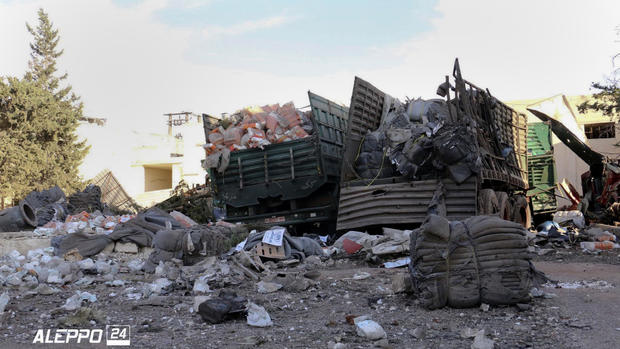Syria announces new offensive in wake of cease-fire collapse
ALEPPO -- Syria’s military command for Aleppo says it is commencing operations in the contested city’s rebel-held eastern quarters.
In a statement carried on state news Thursday the command calls on citizens to keep away from “terrorist groups.” It says it will provide shelter to any residents leaving the neighborhoods through designated safe passages.
It was not clear from the statement whether it will start ground operations or air raids.
Activists say at least 12 people have been killed in presumed government or Russian air strikes and shelling on the eastern quarters Thursday.
A spokesman for the Nour el-Din el-Zinki rebel factions in the city says government forces have not been able to make any advances in the city in the last 24 hours.
Secretary of State John Kerry says the current trajectory of efforts to work out a diplomatic solution for Syria can’t continue after the collapse of the cease-fire and the Syrian government’s announcement of a new offensive on Aleppo.
Kerry says the U.S. will continue pushing for a negotiated truce and political transition that can end five years of war.
But he says Washington cannot be successful alone, and needs Syria’s government and its chief backer, Russia, to do their part.
Kerry says, “We can’t go out to the world and say we have an agreement when we don’t.”
He spoke Thursday after meeting with the top diplomats of Russia and more than a dozen European and Arab countries.
With Syria’s cease-fire in shambles, the United States and Russia are preparing to butt heads once again over ways to revive it.
Amid widespread disagreement Thursday between Washington and Moscow and internal dissent within the Obama administration over how or even if to proceed, Secretary of State John Kerry and Russian Foreign Minister Sergey Lavrov convened what diplomats expected to be a fractious meeting of the roughly 20 nations that have declared interests in Syria.
The International Syria Support Group was to consider a U.S. call for all warplanes to halt flights over aid routes following an attack on a humanitarian convoy near the besieged city of Aleppo, as well as a Russian suggestion for a three-day pause in fighting to get the “cessation of hostilities” back on track. However, diplomats said prospects for the success of either idea were unclear.
Syrian President Bashar Assad told the AP in an interview in Damascus that the United States was to blame for the deal’s failure.
Kerry’s proposal to halt all flights was met with disagreement both in Moscow and even in Washington. The top U.S. military official told Congress he thought grounding all warplanes was a bad idea and Russia’s deputy foreign minister said grounding the flights would make matters worse.
“I would not agree that coalition aircraft ought to be grounded,” said Gen. Joseph Dunford, chairman of the Joint Chiefs of Staff. “I do agree that Syrian regime aircraft and Russian aircraft should be grounded.”
Assad told The Associated Press that the U.S. lacked “the will” to join forces with Russia in fighting extremists and rejected Washington’s claim that an errant U.S. airstrike last week that killed 62 Syrian troops was accidental.
The diametrically opposed views of Washington and Moscow were on full display at a U.N. Security Council meeting on Wednesday that had originally been called to enshrine the truce. Instead, members rued the possibility of a darker phase in the conflict amid increased attacks on humanitarian workers. And, in unusually blunt language, they illustrated why they’ve been unable for more than five years to stop Syria’s civil war.
“Supposedly we all want the same goal. I’ve heard that again and again,” a visibly angry Kerry told the council. “Everybody sits there and says we want a united Syria, secular, respecting the rights of all people, in which the people of Syria can choose their leadership. But we are proving woefully inadequate in our ability to be able to get to the table and have that conversation and make it happen.”
While the U.S. and Russia have previously jousted over proposed resolutions critical of the Syrian government, Wednesday’s agenda didn’t even include a suggested course of action. Instead, the two-hour discussion served as a warm-up act for Thursday’s meeting.
Kerry blamed Russia, lambasting what he portrayed as a cynical response to an airstrike on a humanitarian aid convoy this week that killed 20 civilians and raised “profound doubt” about Russia’s and Syria’s willingness to abide by the cease-fire. The U.S. believes that a Russian-piloted aircraft carried out the strike, said a senior American official, who wasn’t authorized to speak publicly on the matter and demanded anonymity.
Russia has denied U.S. claims that it was responsible, but Kerry focused on its shifting explanation of what might have happened.
First, Kerry said, Russian President Vladimir Putin’s press secretary described the attack as a “necessary response” to an alleged offensive by al-Qaida-linked militants elsewhere in the country. Then, a Russian ambassador said forces were targeting another area.
Russia’s Defense Ministry followed by saying the aid convoy was accompanied by militants in a pickup truck with a mortar, Kerry said, adding that no such evidence exists. Then, the ministry denied any Russian or Syrian involvement as its spokesman suggested, in Kerry’s words, that “the food and the medicine just spontaneously combusted.”
“This is not a joke,” Kerry exclaimed, urging all to stop the “word games that duck responsibility or avoid the choices ... with respect to war and peace, life and death.” His pleas crossed paths with another statement by Russia’s government, this time suggesting a U.S. coalition Predator drone was operating nearby when the convoy attack occurred. The Pentagon said no drone was in the area at the time.
It was one of Kerry’s most bitter exchanges with Moscow as secretary of state, laced with invective and outrage.

